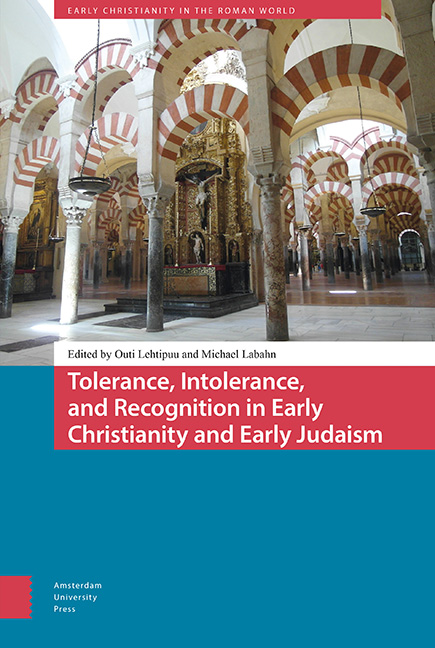9 - “No Male and Female”: Women and the Rhetoric of Recognition in Early Christianity
Published online by Cambridge University Press: 16 July 2022
Summary
Abstract
While tolerance is essentially based on disagreement, in recognition theories recognition of others means granting them a positive status despite disagreement or different values. Noting that the slogan of “no male and female” in Galatians 3:28 is often interpreted as reflecting universal recognition of human beings despite their gender, this article analyzes how ancient authors used Paul's statement. It criticizes recognition theories for downplaying the power structures inherent in acts of recognition: the one who recognizes defines the criteria for recognition and, thus, creates the identity that is recognized.
Keywords: recognition; Paul's Letter to the Galatians; gender; tolerance
We’re not simply tolerating each other – you tolerate a toothache, I don't want to be tolerated. We respect, we embrace, and we celebrate, which is fantastic. Sadiq Khan, mayor of London, The Guardian (May 2016)
Tolerating diversity and fostering tolerance of others have both become key values and constant challenges in contemporary multicultural and multireligious societies. Recently, however, critical voices – such as that of Sadiq Khan, the first Muslim mayor in a Western metropolis – have challenged the policy of tolerance as being insufficient. Tolerance is essentially based on disagreement – and we need more than just to accept what we dislike or disagree with. We need to recognize one another's right to live and prosper – we need to respect, embrace, and celebrate diversity.
The distinction between tolerance and recognition can be illustrated by women's experiences in different political, economic, religious, and intellectual contexts, including the academic world. Undoubtedly, women have long been tolerated in academia, but in a world of “manels” (all-male panels), “mansplaining” (patronizing or condescending comments by a man to a [younger] woman), and “Festicles” (Festschrifts in honor of men with contributions by other men) it may be asked whether women are truly recognized. If they are, as what are they recognized – and by whom?
In recent decades, recognition has become an important analytical concept in critical social theory, closely connected with social justice and the identity politics of minority groups. The basic question deals with how different people who identify themselves by categories such as ethnicity, gender, economic status, sexual orientation, or religious affiliation can live together in the same society while enjoying ever greater self-determination and political autonomy.
- Type
- Chapter
- Information
- Publisher: Amsterdam University PressPrint publication year: 2021

